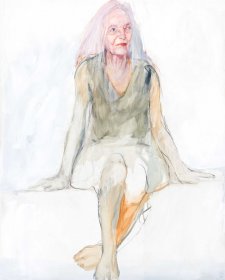- About us
- Support the Gallery
- Venue hire
- Publications
- Research library
- Organisation chart
- Employment
- Contact us
- Make a booking
- Onsite programs
- Online programs
- School visit information
- Learning resources
- Little Darlings
- Professional learning
Joseph Dalton Hooker (1817–1911) was one of the nineteenth century’s most eminent botanists. Hooker is said to have demonstrated an interest in science from a very young age, as a child attending lectures delivered by his father, William Jackson Hooker, at Glasgow University. Aged 15, he was formally admitted to the university as a student, initially in classics and mathematics and then medicine. On graduating in 1839, Hooker joined the Naval Medical Service and was appointed to the position of assistant surgeon and naturalist to one of the two ships engaged in James Clark Ross’s expedition to Antarctica. Between 1839 and 1843, the expedition sailed along a vast stretch of the Antarctic coast and also visited islands in the southern Atlantic and Indian Oceans, Tierra del Fuego, New Zealand, Van Diemen’s Land and (briefly) Sydney. Hooker published the results of the botanical explorations he conducted on the trip in three landmark texts, Flora Antarctica (1844–47), Flora Novae-Zelandiae (1853–55) and Flora Tasmaniae (1855–60). The third of these volumes was particularly significant for containing an essay in which Hooker supported the then controversial theory of natural selection proposed by his close friend, Charles Darwin. Between 1847 and 1851, Hooker travelled in India, Nepal and Tibet, making detailed studies of the flora and topography of these regions. Hooker succeeded his father as Director of the Royal Botanic Gardens at Kew in 1865, remaining in this role until his retirement in 1885.
Collection: National Portrait Gallery
Purchased with funds provided by L Gordon Darling AC CMG 2009
Sir Joseph Dalton Hooker OM (age 63 in 1880)
L Gordon Darling AC CMG (38 portraits supported)



On one level The Companion talks about the most famous and frontline Australians, but on another it tells us about ourselves.



The Darling Prize is a new biennial prize for Australian portrait painters, painting Australian sitters. The winner receives a cash prize of $75,000.



This exhibition showcases portraits acquired through the generosity of the National Portrait Gallery’s Founding Patrons, L Gordon Darling AC CMG and Marilyn Darling AC.